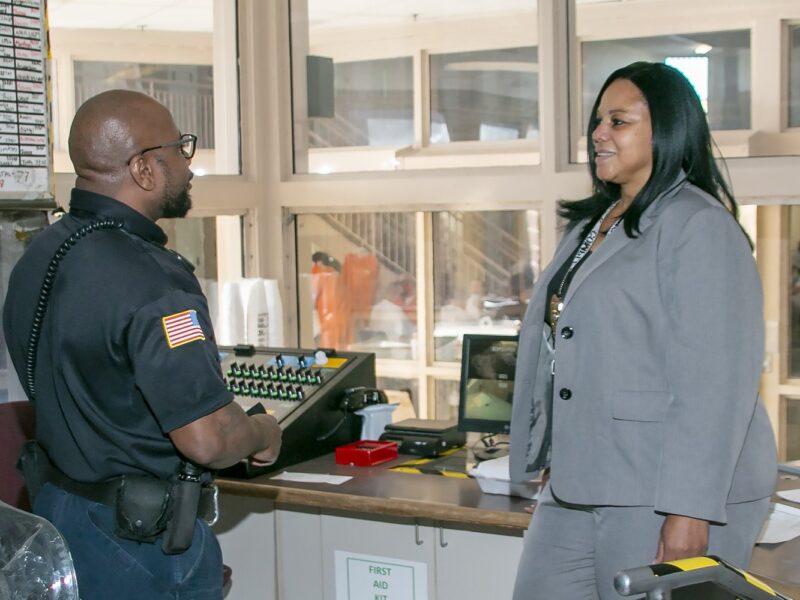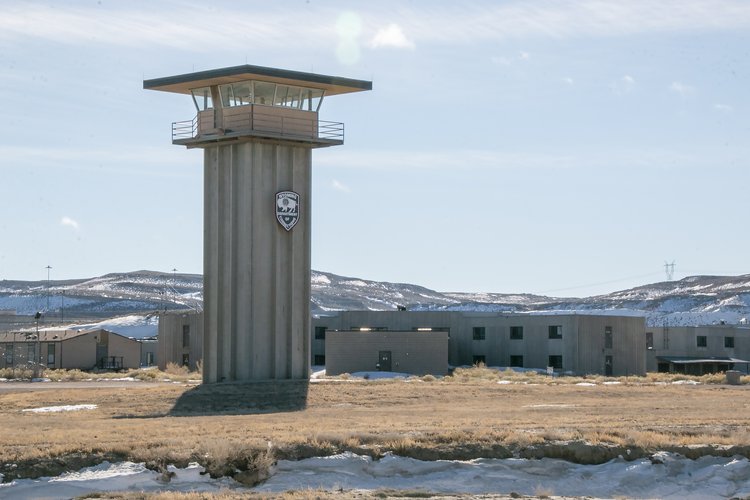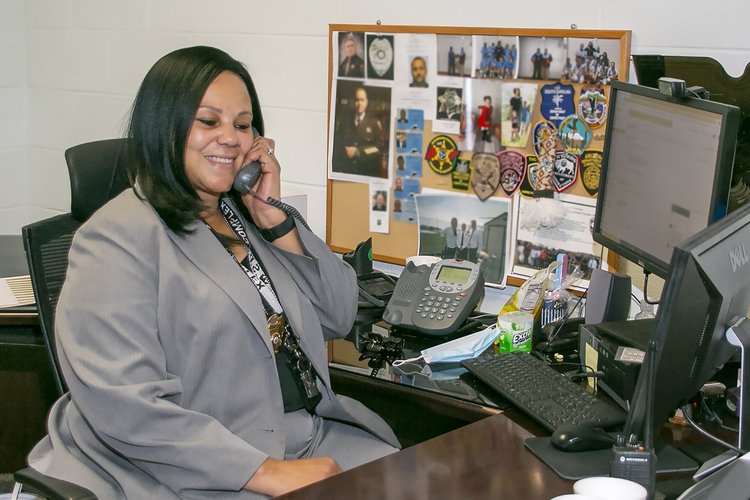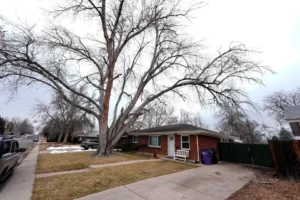First Female Warden Takes Over at State Penitentiary
Molden wants to resolve staffing shortage and add job training for inmates
- Published In: Criminal Justice
- Last Updated: Jan 26, 2022

Wyoming State Penitentiary Warden Neicole Molden, right, talks with Sgt. Jason Wade inside a guard station. Molden recently became the first female warden at the 42-year-old Wyoming State Penitentiary in Rawlins and the third African American to hold the title of warden for the Wyoming Department of Corrections. (Photo by Christine Kronz for the Wyoming Truth)
By Shen Wu Tan
Special to the Wyoming Truth
A stolen license plate led Neicole Molden, the newly appointed warden at the Wyoming State Penitentiary, to discover that she wanted to pursue a career in criminal justice.
While in her early twenties, someone had snagged Molden’s license plate off her car as she sat at Oil City Liquors in Casper. The responding police officer offered to escort her home to make sure she arrived safely.
That situation and positive interaction with the officer sparked her interest in law enforcement, Molden said.
Now, after working more than 28 years in criminal justice, Molden has become the first female warden at the 42-year-old Wyoming State Penitentiary in Rawlins and the third African American to hold the title of warden for the Wyoming Department of Corrections.
She said her appointment as warden shows that women can do anything.
“I feel proud to be able to represent what women can do as a whole,” said Molden, a 51-year-old mother of three children. “I feel honored to be able to represent because I know where I came from, I know what I started as, I know what I had to do to start my career, and I know how far I’ve come. And it took me about 30 years for me to get to this point.”
“My goal is to always try to help people,” she said. “I think in my head I can’t help anybody unless they want to help themselves. So, I figured I’m there to give them the tools and to try and assist them because I feel like at the end of the day these people are coming back into our community. And so it could be one of my neighbors. So, I at least want to give 100% of what I can to help them be successful.”
Molden said her top priority as warden is to address the chronic staffing issues to avoid overworking employees and frequently placing inmates under lockdown.
“My plan is to assess overall what’s in the best interests of the staff and inmates,” she said. “Right now, with my new deputy warden that’s just coming onboard, we’re going to be looking at ways to try and achieve both aspects, try to make it where staff aren’t feeling so burdened and so overwhelmed and so overworked with overtime and things like that and also make sure we’ve got the inmates coming out.”
The males-only facility lost 65 employees last year, of which 35 were security staff, such as correctional officers, and 30 were non-uniformed support staff, Molden said. Staff left for a variety of reasons, including retiring, accepting other jobs and moving out of state. The Wyoming State Penitentiary hired only 28 new workers in 2021.

“For several years WDOC [Wyoming Department of Corrections] has had, and continues to have, staffing issues,” said Paul Martin, deputy administrator of the transparency division for the Wyoming Department of Corrections. He said the Wyoming State Penitentiary and the Wyoming Women’s Center in Lusk have a harder time hiring and keeping staff than the other three state prisons (which mostly house males although two facilities house or will later house a small number of females) and “continually incur significant amounts of overtime due to vacancies.” Martin noted that the general economic conditions for prisons on a national scale and the rural areas where the facilities are located contribute to the staffing issues.
The Wyoming State Penitentiary can hold up to 720 minimum- and maximum-security inmates, making it the largest of the five state prisons. It houses about 540 inmates, although that number can change daily. The penitentiary employs about 200 workers with another 51 staff vacancies unfilled, including about 34 correctional officer positions, Molden said.
Molden said that if the prison had more staff, then they could open up more beds. Instead, staff shortages mean they have to shuffle inmates around to one of the four other prisons within the state or house them temporarily at a county jail.
It is a struggle to recruit and retain staff at the Wyoming State Penitentiary due to lower starting pay, the farther distance of Rawlins from other cities and various recreational amenities, and budget cuts, Molden noted.
Since 2015, the Department of Corrections budget has shrunk by about $31 million, from $291,645,286 to about $260 million – an 11% decline — this fiscal year, Martin said. He added the budget request approved by Gov. Mark Gordon and under consideration by the Joint Appropriations Committee for 2023-2024 is for $260,285,023, about the same as the actual budget for the current fiscal period. The approved budget for 2021-2022 fiscal period was about $288 million, Martin said, but dropped to roughly $260 million (a 10% decline) after cuts.
The COVID-19 pandemic didn’t help with recruitment efforts, adding another challenge to hiring enough staff to manage inmates.
“In general, across the nation, corrections is just something that always has problems recruiting, but now it seems to be worse than ever with everything going on in the world,” Molden said. “People are fearful. All they hear is that COVID is inside the walls at the prison, that they’re confined with these inmates who have COVID and things like that, and it scares people.”
In addition to resolving staffing issues, Molden said she wants to add more programs to help inmates learn job skills. A new greenhouse arrived at the penitentiary several weeks ago so that this spring, inmates can learn to grow their own food and start farming, she said. Molden said the prison has partnered with the University of Wyoming to donate the food they grow to lower-income families as a way to give back.
“I think there needs to be more funding for some of the programs in prisons so the inmates have things to do, they have more capabilities to learn,” she said. “We’re limited in what we can help them with because of our funding and certain criteria that we have to meet. I think instead of just housing inmates, we have to educate the inmates, especially, again like I said, because a lot of them are going to be coming out to society.”

“Inmates are sentenced to prison for their punishment,” Molden said. “It does not mean we punish them once they are there. That’s where rehabilitation should kick in.”
Molden, who now lives in a warden residence about a seven-minute drive from the prison, officially took on her new role as warden Dec. 17, although she served as interim warden when former Warden Michael Harlow retired in October.
“It’s been a very humbling experience,” she added. “I love watching the staff grow. I love watching the inmates grow. Even if we only touch one inmate, to me it’s worth what we have to do to come to work every day.”
She was hired by the Department of Corrections in 2009 as a unit manager supervisor at the Wyoming Medium Correctional Institution. She formerly served as deputy warden at the Wyoming State Penitentiary and as associate warden at the Wyoming Women’s Center.
Rick Catron, warden at the Wyoming Women’s Center, said he worked with Molden for about two-and-a-half years at the prison, and he said she helped transform the prison with open communication between staff and inmates.
“The entire environment in this facility changed to a pro-social environment under Neicole,” Catron said. “I had attempted to start it, but it was very difficult to do until she came on board …This facility really changed for the inmates and the staff. It really became a smooth-running facility.”
Catron said he never doubted Molden would eventually run the Wyoming State Penitentiary.
“I’m very proud of her,” he said. “To be the first female warden of the penitentiary over there is quite an accomplishment.”
Molden has a bachelor’s degree in criminal justice from the University of Wyoming and a master’s degree from the University of Phoenix, making her the first and youngest of 11 children in her family to pursue a higher education beyond high school.
Molden said that when she was younger, she had uncles and cousins serving time in prison, although most of them were sent to prison before she started her career at the Wyoming Department of Corrections.
“I have family members who were gang bangers,” Molden said. “I have family members who’ve been drug dealers before.”
While most were in prison for drug charges and repeat offenses like burglary and thefts, one relative was in prison on a murder charge. Her incarcerated family members were housed in Missouri prisons, but all of them have been released, according to Molden.
The Cedar Rapids, Iowa, native added she wasn’t a good kid herself growing up in Casper, partying and skipping school often, but she chose a better path for herself.
She said all those experiences help her relate to the inmates she works with on some level today as warden.
“I can relate to both sides of it,” Molden said. “But I also know that they have to want to make that change, and if they don’t want to make that change, anything we do is not going to make a difference.”













